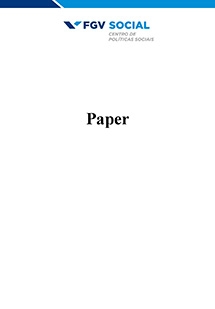
Perceived Human Development Index - Neri, Marcelo Cortes
Sobre o paper:
As the relation between income and well-being, measured by subjective happiness, is not direct, new perspectives are needed. This paper contributes to the discussion by developing a Perceived Human Development Index (PHDI), using the components of the Human Development Index (HDI) – that is, income, health and education – in their subjective versions. The dimension of work conditions was also added to the analysis. At first, an analysis of the priorities of the Brazilian population is made in terms of public policy vis-à-vis the global population through the questionnaire in My World, from the UN, incorporated in the SIPS. The global priorities are "quality education" and "improvement of health services", in that order. In the Brazilian case, there is an inversion on the order of these priorities, with health appearing in 85.5% of the questionnaires and education in 81.8% of them. In any case, the three most prominent elements both in Brazil and in the world represent the three components of the HDI.
The principal component analysis (PCA) applied to more than two dozen subjective questions allowed for eliminating the redundancy among similar queries, revealing a convergence of topics in two fronts, chance indicators versus outcome indicators, as well as the existing dichotomy between internal indicators on the status of the individual and external perceptions about society and associated policies. The relation between the respective components of the HDI and PHDI is also explored and the results indicate that the perceptions of individuals with income, education, health and work are relatively adherent to their counterparts' goals. Particularly, when we deal with internal perceptions about the status of the individual and less with external perceptions of associated policies. A ranking of the PHDI is presented for 109 countries in the full version of the book, with Singapore in the first place and Haiti in the last. Brazil was in position 62.
The weights assigned to each of the three components of the PHDI were also investigated for life satisfaction reported by individuals. The results of the regression show that the weight attributed to inner income perceptions is 64%, outer income perceptions 17,6%, inner health 8,9% and outer health 9,1% while outer education got a null weight. These results suggest that the sum of the assigned weights to each of them is not far in terms of magnitude from those estimated on a similar equation of life satisfaction in relation to objective indicators of the HDI, but different from metrics that assume equal weights used in the calculation of the standard HDI. On the other hand, the hypothesis that different age groups confer different weights to the components of the HDI is rejected. In general, the construction of the PHDI allows, by means of a summarizing indicator of subjective nature, for complementary analyses to those undertaken with the traditional HDI.




